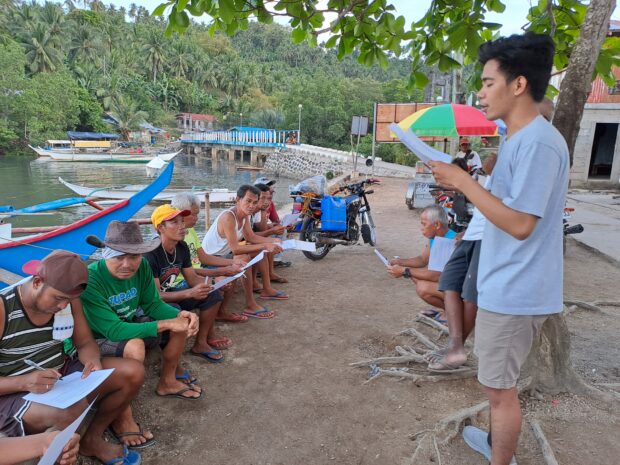Environment coalition finds ‘insufficient’ aid given to Mindoro oil spill victims

Members of an alliance of environmental groups and scientists conduct a fact-finding mission in Oriental Mindoro following the oil spill. Photo from Kalikasan People’s Network for the Environment
MANILA, Philippines — A coalition of scientists and environmental groups had launched an independent fact-finding mission to the areas affected by the Oriental Mindoro oil spill, which found that insufficient aid had been given to residents.
The group, composed of Brigada Kalikasan, Agham Advocates for Science and Technology for the People, Center for Environmental Concerns (CEC) Philippines, and Serve the People Corps – Southern Tagalog, conducted the mission from April 1 to 3 and covered two municipalities and six barangays, surveying over 400 residents.
According to the group’s report, while most locals have received some form of assistance, nearly all of their respondents found the aid “insufficient.”
“While most residents have received aid over the past few weeks, nearly 100 [percent] of respondents also reported that the aid they received was ‘insufficient’. Ayuda packs would mainly come in the form of food, while other needs such as hygiene supplies for infants or money for allowances and transportation for children going to school were not addressed,” said the coalition in a statement on Monday.
The coalition urged for an improved and hastened national government response.
“On top of environmental issues, residents are having to deal with little to no income these past few weeks, causing trickle-down effects on their health and education…the impacts of the oil spill and fishing ban are also long-term, so it is not enough to just give one-time assistance,” said CEC research coordinator Jordan Fronda.
When asked about the group’s results, the Department of Social Welfare and Development (DSWD) on Tuesday asserted that it has been giving enough aid.
“The Department emphasized that through its good partnership with the [local government units] in the affected areas, sufficient assistance, in different forms, was provided to fisherfolks and other residents in Oriental Mindoro,” said the DSWD in a statement.
According to the DSWD, the support to residents has been continuous, with 74,300 food packs distributed to different municipalities in Oriental Mindoro. A total of 14,000 people have also participated in the cash-for-work program, and have “received their initial salaries equivalent to their regional daily minimum wage.”
The DSWD also said that while local government units are tasked with providing immediate aid, the national government agencies have also provided interventions to affected communities.
Other than the survey, the group also conducted interviews, focus group discussions, and ocular inspections. The full report has yet to be released to the public.
The disastrous oil spill began when the MT Princess Empress sank off the coast of Oriental Mindoro on February 28, prompting a fishing ban in several areas. It has since affected 173,000 people.
RELATED STORIES:
Oriental Mindoro oil spill affects nearly 173,000 people — NDRRMC
Low-level contaminants found in fish in oil spill areas
